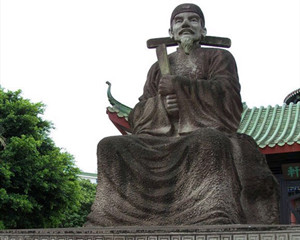这篇古文概括了海瑞的生平。海瑞(1514—1587),字汝贤,号刚峰,回族人,广东琼山人。明嘉靖举人,初任南平教谕、浙江淳安知县。嘉靖四十五年任户部主事时,上《治安疏》劝谏明世宗,获罪下狱,世宗死后得释;隆庆三年(1569)以右佥都御史巡抚应天,遭弹劾革职;万历十三年(1585)再起,任南京佥都御史,又改南京吏部侍郎,后在任所去世。

周晖·《刚峰宦囊》
都御史刚峰海公卒于官舍,同乡宦南京者,惟户部苏怀民一人。苏点其宦囊,竹笼中俸金八两、葛布一端、旧衣数件而已。如此都御史,那可多得!王司寇风洲评之云:“不怕死,不爱钱,不立党。”此九字断尽海公生平,即千万言谀之,能加于此评乎?
Hai Rui's Possessions and Property
Zhou Hui (1546-1623)
Mr. Hai Gangfeng, 1 the highest-ranking official of the Central Censorate, 2 passed away in his official residence. The only person from his hometown in Nanjing was an official called Su Huaimin in the Ministry of Revenue. 3 When Su checked the possessions and property Mr. Hai had left behind, he found nothing except eight taels of silver (his salary), several meters of plain cloth and a few pieces of some worn-out clothes in a bamboo container. Where can people find one more such Grand Censor? Wang Shizhen, Minister of Justice of his time, made his comment by saying, “He did not fear death, nor did he take a fancy to money, or from a clique with anyone.” Wang's words properly summarized Hai Rui's life. Even if thousands of words could be used to praise him, no other comments could surpass this one.
1. Hai Gangfeng (1514-87), better known as Hai Rui, was a famous Chinese official during the Ming Dynasty. His name has come down in history as a model of upright morality, scrupulous honesty, fairness and integrity in office.
2. It pinyin is Ducha Yuan, the top-level central supervisory agency in ancient China. Officials working there were known as censors. They were directly accountable to the emperors and served as the “eyes and ears” to check the top-level officials to prevent corruption.
3. It is equivalent to today's Ministry of Finance.
(王宏、张顺生 译)
更多精品翻译素材,敬请关注可可英语。












